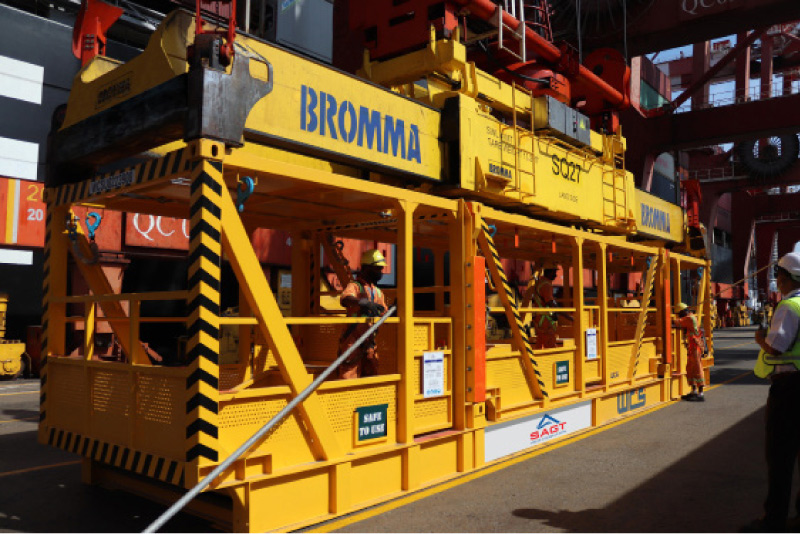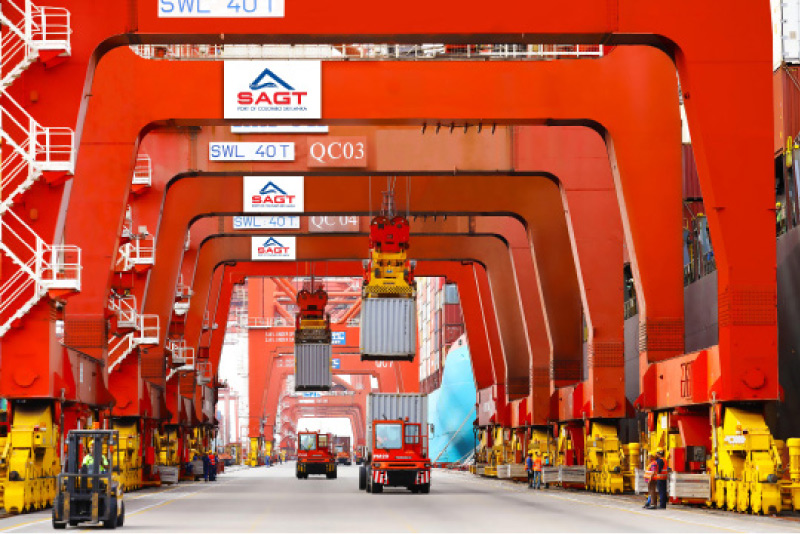Monday Feb 23, 2026
Monday Feb 23, 2026
Friday, 28 May 2021 00:14 - - {{hitsCtrl.values.hits}}

Lashing Cages
With the onset of the pandemic and wide-scale lockdowns in many parts of South Asia in early 2020, transhipment volumes at the Port of Colombo and South Asia Gateway Terminals (SAGT) dropped sharply, as shipping lines, ports and other related businesses strove to come to terms with what would possibly be a prolonged downturn in business.
With the benefit of hindsight though, this was not to be the case and — as was seen in the latter half of 2020 — the recovery in shipping volumes was swift and sustained. Consequently, all maritime service providers have had to rethink and redesign networks and processes to meet the surge in demand in the ‘new normal’.
Given the unanticipated increase in global trade, shipping lines and their customers faced challenges due to shortages in vessel space and container availability. In turn, terminals were expected to drive faster vessel turnaround times and assist in the speedy delivery of import containers.
To accommodate faster delivery of import containers, the Port of Colombo launched a digitalised import clearance process to facilitate the timely evacuation of import containers while adhering to social distancing protocols.
SAGT was at the forefront of this initiative and introduced a simple email-based process for the processing of documents and issuance of electronic delivery advice (e-D/A). This enabled customers to have the convenience of carrying out their clearance activities while in the comfort and safety of their own homes.
SAGT’s swift adaptation and implementation of the e-DA initiative propelled the new process with immediate benefits and changed a decade-old process of physical collection of delivery documents at ‘Documentation Centres’ run by the terminals.
SAGT followed up this initiative with an integrated, secure online platform added on to its online portal, ‘e-Port’, which allows customers the convenience of calculating charges and making payment online via an online electronic payment process. e-Port has further extended benefits to the customer through the automated reconciliation of payments received via the online payment platform and real-time generation of the invoice via the system.
That innovation was combined with an electronic release by Sri Lanka Customs, thus automating and making contactless a physical and manual process that the trade had been endeavouring to change for almost a quarter of a century.
Demonstrating its continued support of the importer community, SAGT offers an automatic extension of the import container gate pass validity to 6:00 a.m. on the day after the gate-pass expiry, further enabling the trucker additional free time for pick-up of the import container without delay or terminal storage charges for an additional six hours.
As part of the drive to create a safer working environment, SAGT in March 2021 became the first and, to date, only terminal in the Port of Colombo to implement the use of Container Top Safety Work Cages, thereby enabling lashing contractors to execute onboard container unlashing/lashing operations under significantly improved working conditions. An essential feature of the safety cage is the ability to sustain container lashing operations in adverse weather conditions such as rain and wind with no loss of safety, thus further allowing seamless working patterns for vessel productivity.
In a further commitment to enhance operational capabilities and quayside productivity towards meeting customer expectations, SAGT confirmed an order for two super post-panamax, twin-lift ship-to-shore (STS) cranes with ZPMC – China, for delivery in March 2022. The induction of these STS cranes in 2022 will increase the terminal’s quayside capabilities to five twin-lift and seven single-lift STS cranes. SAGT also re-fleeted over 65% of its fleet of terminal tractors with the induction of 46 brand new Terberg terminal tractors during the past year.
Underscoring its commitment to implementation of identified United Nations Sustainable Development Goals (SDGs), and in keeping with the global drive for a greener shipping industry, SAGT has embarked on a program to convert all its diesel-powered rubber-tyred gantries to part-electric, employing state of the art hybrid technology developed by Yasakawa of Japan. Aimed at reducing diesel consumption and thereby CO2 emissions by 50%, this project is scheduled for completion in 2021.

Yard